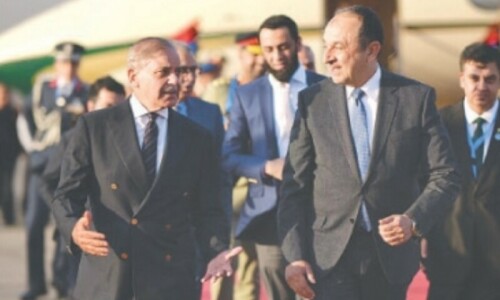THOSE of us who participate in intellectual discussion through reading and writing, speaking on TV or in other public forums, or indulge in an exchange of opinion in various informal social settings constantly interact with the national discourse.
Conversely, Zia’s policy of Islamising the laws, education and the economy led to the emergence of a vehement counter discourse about the well-being of women, minorities and other underprivileged groups. In Pakistan, the model whereby the government’s policy created the discourse a generation earlier has given way to one where the discourse guides policy as we see in the case of the Taliban and the jihadi parties.
All this has undone Jinnah, the Gujrati-speaking Shia leader of a predominantly Sunni Muslim nation whose wife was a non-Muslim prior to marriage and who pronouncedly believed in de-conflation between religion and politics.
The two generations of leaders and intellectuals after Independence comprised de-conflationists including Jinnah, bureaucrats Ghulam Mohammad and Iskandar Mirza, Justice Munir, Gen Ayub, ambassadors from Ikramullah to Agha Shahi, poets from Josh to Faiz and journalists from Mazhar Ali Khan to Altaf Husain.Pakistan experienced a predominantly religious discourse from the 1980s onwards. It was based on the maxim that the ends justify the means. There followed the mobilisation of Islamists by successive rulers in pursuit of policy goals in the wars in Afghanistan and Kashmir abroad and in fighting the ethnic movements at home. But, the means reshape the ends.
The discourse as a means leads to ever-new and expanding policy goals. The means adopted during the Afghanistan war churned out thousands of armed and trained Mujahideen, various ideologues of ‘strategic depth’, reinvigorated Islamic parties and groups increasingly given to militancy and a war-savvy intelligence outfit that gradually championed a discourse based on conspiracy theory and mistrust of the regional and global powers.
The nation moved from the expression of tradition to the projection of ideology with its unsettling consequences. It moved from a reflective identity in a collective mode of expression to a prescriptive code of personal behaviour. It moved from a representational model of state-society relations to a mobilisational model of the national agenda.
A putative project of decolonisation of the mind led to deification of pre-colonial 18th-century India and beyond. The national discourse failed to exorcise the ghost of the West or that of the past. The dim and the damned mediaeval vision of history flourished at the cost of analysis of the current economic and political forces shaping the contemporary world.
The ulema, who became redundant in the colonial set-up, that took away their role from both the educational and justice systems, have staged a comeback after 200 years, thanks to the continuation of the Ziaist project of Islamisation at home and jihad abroad. Apart from madressahs and the nizam-i-adl — the traditional preserves of their influence — the ulema have penetrated the professional edifice, the educational system and the legal-institutional machinery of the state.
The security apparatus of Pakistan has contributed to a siege mentality, the obfuscation of citizen-orientations and the subjection of human rights to a strident statism in the name of national sovereignty such as in the memo case. The most modern, hierarchically organised, efficient and meritorious army has been held responsible for perpetuating a pre-modern worldview among the general public. It has supported the tidal wave of anti-Americanism, after opening its heart and mind to Washington for half a century, and fighting what was labelled as Charlie Wilson’s war in Afghanistan.
All these factors have led to a national discourse characterised by a dichotomous worldview along the lines of Islam versus the West and underscored by the idiom of the crusades of mediaeval history. Not surprisingly, the nation has appropriated the most reactionary idea of the clash of civilisations. It has been embroiled in a mini clash of civilisations in South Asia drawing on Hindu and Muslim traditions on the one hand and the conflict between the Islamic and Judeo-Christian traditions at the global level on the other.
Secondly, demonisation of the ‘other’ has become an article of faith in the national discourse. We often demonise the religious but also the sectarian and ethnic ‘other’. The policymakers have erected sacred barriers to national integration through fragmentation of society into identity boxes. Ideologisation of the process of thinking and formulation of ideas has created an anti-intellectual state that is intolerant of conceptualising multiple interpretations of the route to progress and stability.
The current scholarship on Pakistan claims that the nation is in a permanent state of denial. Did man land on the moon? No. Were the twin towers in New York destroyed by Muslim zealots? No. Was Osama bin Laden killed in Abbottabad? No. Did the operatives of a banned jihadi outfit carry out attacks on Mumbai from Pakistani soil? No. Is Pakistan diplomatically isolated? No. Are we lagging behind other South Asian states in economic growth, social justice and political maturity? No.
Instead of moving forward to establish friendship networks in the region and beyond, the emergent leadership of the ilk of Imran Khan has settled down for a one-dimensional discourse based on ‘us versus them’.
This perspective sanctifies negotiations with terrorists and public participation in the activities of banned terrorist groups. The state has done incalculable damage to its monopoly over implements of violence that guarantees its writ. There are no signs that it wants to revisit its adventurous policy.
What can be done? Educationally speaking, ‘de-demonisation’ of the ‘other’ is imperative. Diplomatically, the answer lies in a vehement ‘de-isolation’ programme at both the regional and global levels.
Politically, we must operate under the constitution not above the constitution. Institutionally, powers and responsibilities of various departments must follow the manual. Strategically, let us talk of peace not war, for once. Culturally, we should create sensitivity in the public towards the 21st-century view of the makers and shapers of the national destiny.
The writer is a professor at LUMS.











































Dear visitor, the comments section is undergoing an overhaul and will return soon.